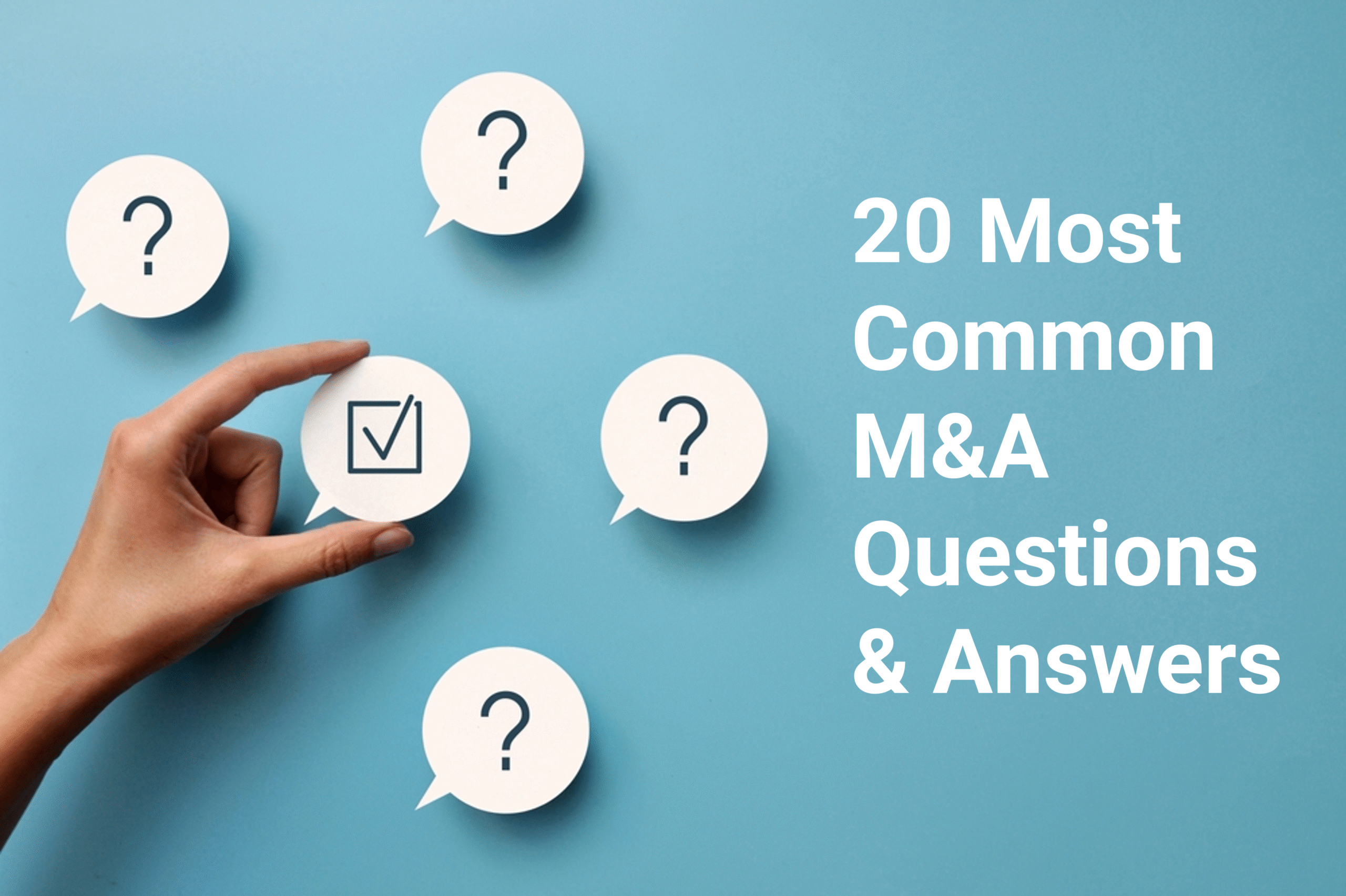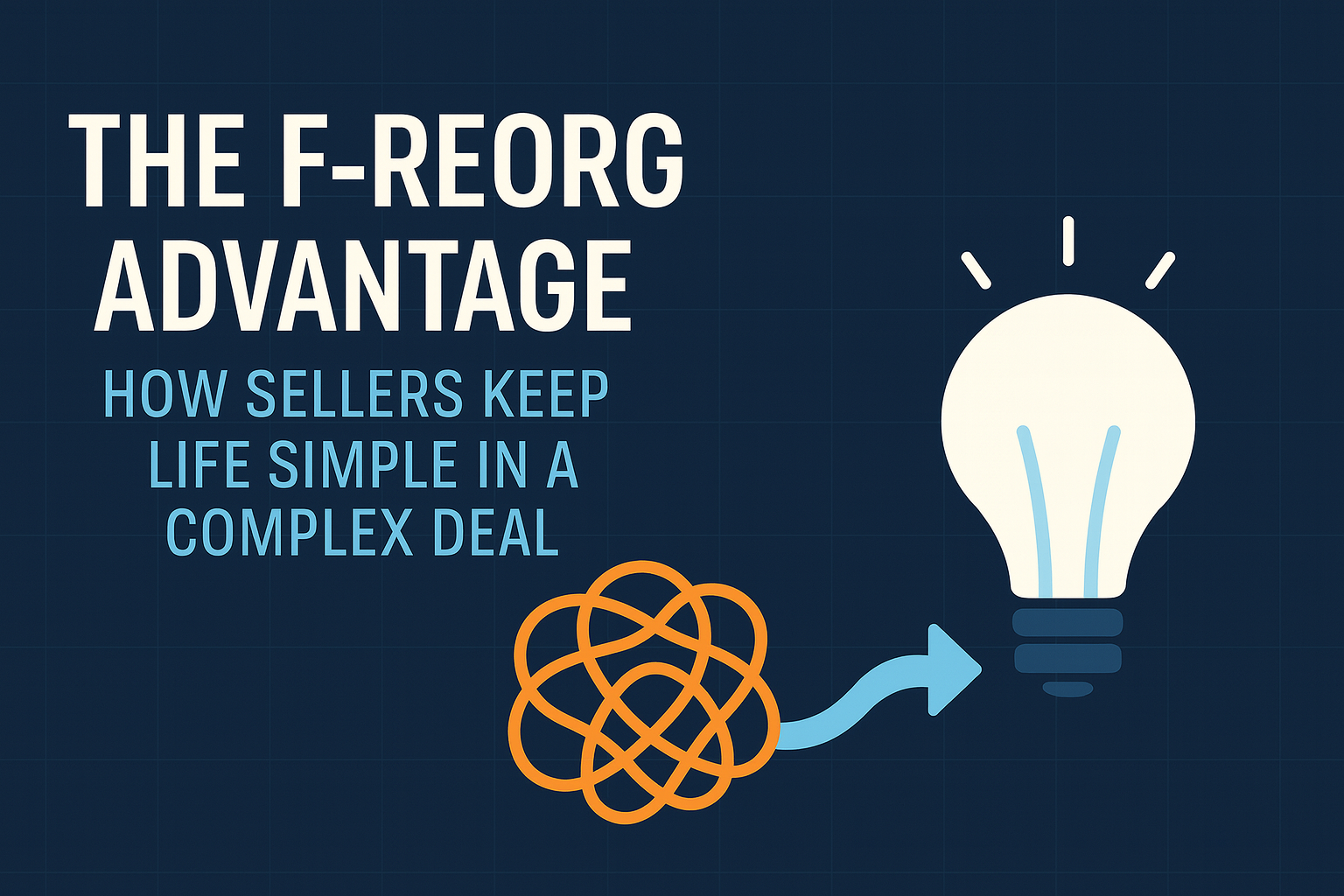If you’re a founder thinking about selling your MSP, IT services company, or software business, you probably have a hundred questions running through your head. The M&A process is complex, the stakes are high, and, for most owners, it’s the first and only time they’ll go through it. Over the past 30 years as an entrepreneur and sell-side M&A advisor, I’ve been asked these questions countless times in boardrooms, coaching sessions, and late-night emails from nervous CEOs.
I always find it interesting how the same themes consistently come up: What’s my business worth? How do buyers calculate EBITDA? Should I sell stock or assets? What happens to my employees? And these are not just technical details; they’re the decisions that can make or break your deal.
That’s why I’ve pulled together the 20 most common questions business owners ask about selling their company, along with my straightforward, experience-based answers. Whether you’re preparing to sell in the next 12 months or simply want to understand how buyers think, this list will give you a solid foundation to start planning.
1. How do I know if it’s the right time to sell my business?
The right time is usually when your business is growing, profitable, and not overly dependent on you, personally. Revenue should be on an upward swing of at least 10% or more year over year. Markets matter too. Industry multiples and buyer appetite can shift. Most owners wait too long, selling after growth slows, which lowers their value.
2. What is my company really worth, and how do buyers decide that?
Value is typically based on a multiple of EBITDA adjusted for risk, growth, and recurring revenue. Strategic buyers may pay more if your business helps them expand. Ultimately, it’s worth what a buyer is willing to pay and what you’re willing to accept. Hint: get as many offers as you can. This allows you to negotiate the best price, and then choose the winner based on factors like cultural fit, location, deal terms, etc.
3. What exactly is EBITDA, and why does everyone use it?
EBITDA (Earnings Before Interest, Taxes, Depreciation, and Amortization) shows your company’s true operating cash flow. Buyers use it because it strips out financing and accounting decisions. It’s the common “apples-to-apples” measure for comparing companies.
4. Which add-backs/normalizations are legit, and which will buyers push back on?
Legit add-backs include one-time expenses, owner perks, and non-business costs. Mistakes in SEO, new hires, and recruiters that don’t produce can count as well. Buyers push back on anything recurring or vague (i.e. one-time discretionary bonuses that happen more than one time). The more documentation you provide, the stronger your case.
5. Do buyers pay for future growth or only past performance?
Buyers mainly value proven, historical earnings. Growth potential can boost multiples, but only if backed by data (pipeline, contracts, market trends). Empty projections don’t move the needle, so make sure you have data to back them up.
6. Do I need a Quality of Earnings report (QofE) before I go to market?
A sell-side QofE is optional but often worth it. It validates your numbers, speeds due diligence, and builds trust with buyers. Think of it as a “pre-inspection” before listing your house. Plus, the cost usually pays for itself in the form of additional normalization adjustments.
7. How long does the whole M&A process take, start to finish?
Most lower-middle market deals ($5M-$250M) take 6-9 months. Preparation adds more time, and rushing almost always costs you money.
8. Should I do a stock sale or an asset sale, and why?
Buyers prefer asset sales to avoid hidden liabilities. Sellers prefer stock sales for tax and simplicity. Each structure affects taxes, liabilities, and deal terms. This is a key negotiation point. If you are a C corp and can take advantage of the Section 1202 Qualified Small Business Stock Exclusion, you need to make sure it is a stock transaction.
9. How much will I actually take home after taxes and fees?
It depends on deal structure, your entity type, state taxes, and advisory costs. Many sellers net 60–70% of the purchase price after taxes and fees. Good tax planning can shift that by millions.
10. Will I have to stay after the sale (either for an earn-out, rollover equity, or employment)?
Often yes, especially if your business relies on you. PE buyers may require 1-3 years as a transition period or to rollover equity. A strong management team or second-in-command can shorten this period.
11. What happens to my employees and leadership team after the sale?
Good buyers want your team because continuity protects their investment. Still, redundancies sometimes lead to cuts in admin or overlapping roles. How employees are treated often depends on the buyer type and if they are maintaining your brand identity or not.
12. How do I keep the process confidential so my staff/customers don’t panic?
Use NDAs, staged data room access, and code names. Communicate only on a need-to-know basis until a deal is nearly final, as leaks can damage morale and valuation. And remember, a shut door (like your office door) creates speculation, especially if you normally don’t do that.
13. What should I clean up in my financials before I start (books, KPIs, contracts)?
Move toward GAAP compliance, document add-backs, reconcile revenue recognition, and update contracts. Buyers want clear, defensible numbers. Sloppy books invite discounts.
14. Is my customer concentration going to scare buyers?
Yes, if it’s too high. If one client is more than ~20% of revenue, buyers see risk. You can mitigate this by showing long contracts, strong relationships, or a growing base of smaller customers. High concentration usually reduces multiples unless you have a long-term contract or MSA.
15. What is net working capital (NWC) and why is it always a negotiation at closing?
NWC ensures the business has enough cash, receivables, and inventory to run after closing. Buyers expect a “normal level” at handover. Sellers often lose value if they don’t understand the peg (i.e., average). But remember, NWC does not include cash, which is yours to keep in a cash-free/debt-free transaction.
16. Do I need to pay off my debt before I sell (and how do debt-free/cash-free deals work)?
In most deals, purchase price assumes a debt-free/cash-free transaction. At closing, sale proceeds pay off debt, and excess cash is yours. Buyers want a clean slate, but many times there are expenses that cannot be paid off at close, such as accrued PTO or accrued sales tax. Items like these are treated, instead, as indebtedness and the purchase price is reduced to offset those amounts.
17. What will buyers scrutinize in legal/contract due diligence (assignability, IP, liabilities)?
They’ll check customer and vendor contracts for assignability, IP ownership, pending lawsuits, and compliance issues. Anything unclear or risky can derail or discount a deal. Clean, organized records build confidence. If you have multiple versions of contracts in existence, try to consolidate to one before you sell.
18. How do I choose between a strategic buyer and private equity?
Strategics may pay more if you’re a puzzle piece they need. PE often pays market multiples but offers rollover equity for upside (or second bite of the apple). Your goals (cash-out vs. partnership) should drive the choice.
19. What are the biggest deal killers (price chips, diligence surprises, bad LOIs, leaks)?
Unrealistic valuation expectations, poor financials, hidden liabilities, and weak advisors kill deals. Surprises in diligence almost always reduce price. One example is an unhappy customer which represents 8%-10% of your revenue. The best defense is preparation, such as speaking with your most valued customers to check in on their experience with your company.
20. What can I do in the next 90 days to raise my valuation the most?
Clean up your books, lock in recurring revenue, renew key contracts, and reduce dependency on you in your organization. Quick wins show buyers stability. Even small changes can add big multiples.
Conclusion
Selling your business isn’t just a financial transaction; it’s a personal milestone. The right answers can help you avoid costly deal killers, protect your employees, and maximize your valuation. The wrong assumptions can leave millions on the table.
The truth is: every business is unique. An MSP with strong recurring revenue faces different challenges than a custom software shop or a VAR with vendor concentration. But the fundamentals of what buyers look for (e.g., clean financials, growth potential, a strong management team) remain the same.
If you’re serious about preparing, don’t wait until buyers are knocking. Start addressing these questions now. The earlier you tighten up your EBITDA adjustments, contracts, and net working capital, the more leverage you’ll have when it’s time to negotiate.
And if you want a guide who’s been on both sides of the table – as a founder who sold three companies and as an advisor who’s helped dozens of tech CEOs exit successfully – I’m here to help.


 The F Reorg Advantage: How Sellers Keep Life Simple in a Complex Deal
The F Reorg Advantage: How Sellers Keep Life Simple in a Complex Deal